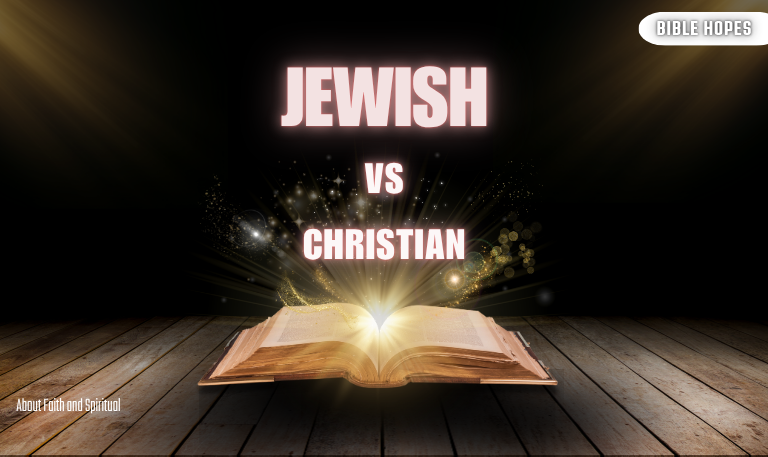Judaism and Christianity are two of the most influential and widely practiced religions in the world, both rooted in the same ancient tradition of Abrahamic faiths. While they share many similarities, there are also profound differences in their beliefs, practices, and historical developments. This comprehensive guide delves into the fundamental contrasts and commonalities between Jewish vs Christian, exploring their history, core beliefs, religious texts, rituals, and more. Whether you’re curious about religious history, theological perspectives, or just looking to understand these two faiths better, this article offers a deep dive into the subject.
A Shared Foundation
Judaism and Christianity both originate from the ancient traditions of the Hebrew Bible, with both faiths recognizing a singular, all-powerful God. The key differences stem from how each religion interprets sacred texts, historical events, and theological concepts. While Christianity emerged from Judaism, its understanding of God, the role of Jesus Christ, and its doctrines of salvation diverged over time, shaping the distinct beliefs and practices that define each faith.
Judaism is the religion, philosophy, and way of life of the Jewish people, who trace their origins to the covenant God made with Abraham.
Christianity, rooted in Judaism, emerged in the 1st century CE with the belief that Jesus of Nazareth was the Messiah and the Son of God, a role not recognized in Judaism.
This shared history and divergent paths make their study both fascinating and complex.
Read Also: God Is In Control Quotes
Historical Context: The Origins of Jewish vs Christian
The Origins of Judaism
Judaism’s roots stretch back thousands of years, beginning with the patriarch Abraham, who is regarded as the father of the Jewish faith. According to the Torah, God made a covenant with Abraham, promising that his descendants would become a great nation. Judaism’s historical development includes the Exodus from Egypt, the establishment of the Kingdom of Israel, and the building of the First Temple in Jerusalem, all pivotal events in the Jewish narrative.
Key Events:
Abraham and the Covenant: The foundational promise that Abraham’s descendants would be God’s chosen people.
Moses and the Exodus: The liberation of the Israelites from slavery in Egypt and the receipt of the Torah at Mount Sinai.
The Kingdom of Israel: The formation of a unified kingdom under King David, later split into Israel and Judah.
The Origins of Christianity
Christianity began as a sect within Judaism, based on the life, teachings, and resurrection of Jesus Christ. Christians believe that Jesus was the promised Messiah, fulfilling the prophecies found in the Hebrew Bible. The early Christians were initially a small group of Jewish followers, but after Jesus’ death and resurrection, the movement spread throughout the Roman Empire, eventually becoming distinct from Judaism.
Key Events:
The Life of Jesus Christ: His teachings focused on love, forgiveness, and salvation.
The Crucifixion and Resurrection: Christians believe that Jesus died for humanity’s sins and was resurrected, offering salvation to believers.
The Apostolic Era: The spread of Christian teachings by the apostles, particularly Paul, who established Christian communities across the Mediterranean.
Key Figures in Judaism and Christianity
Judaism’s Key Figures
Abraham: The first patriarch, regarded as the father of the Jewish people.
Moses: The great prophet and leader who led the Israelites out of Egypt and received the Torah from God.
David: King of Israel, under whom the kingdom was united, and the ancestor of the Messiah in Jewish thought.
Christianity’s Key Figures
Jesus Christ: Central to Christianity, Jesus is believed by Christians to be the Son of God and the Messiah.
The Apostles: The followers of Jesus who spread his teachings; especially Paul, who wrote much of the New Testament and played a critical role in the spread of Christianity.
Core Beliefs: God, Salvation, and the Afterlife
Jewish Beliefs
Monotheism: God is one, indivisible, and eternal. The Shema, a central prayer in Judaism, declares this belief: “Hear, O Israel: the Lord our God, the Lord is one.”
Salvation: In Judaism, salvation is tied to righteous living, adherence to the commandments (mitzvot), and repentance. The concept of the Messiah is also central, though Judaism views the Messiah as yet to come.
The Afterlife: Views vary, but traditional Jewish belief holds that there will be a bodily resurrection of the dead, and the righteous will enjoy the world to come, known as Olam Ha-Ba.
Christian Beliefs
The Holy Trinity: Christianity teaches that God exists in three persons: the Father, the Son (Jesus Christ), and the Holy Spirit. This is a central doctrine of most Christian denominations.
Salvation: Christianity teaches that salvation is a gift from God through faith in Jesus Christ, who atoned for the sins of humanity.
The Afterlife: Christians believe in eternal life after death, either in Heaven (for believers) or Hell (for non-believers).
Sacred Texts: Torah vs Bible
Jewish Sacred Texts
The Tanakh: The Hebrew Bible, consisting of three parts: the Torah (Law), Nevi’im (Prophets), and Ketuvim (Writings).
Talmud: A central text in Jewish life, the Talmud is a collection of teachings and discussions on the Torah, interpreting Jewish law.
Christian Sacred Texts
The Bible: The Christian Bible is divided into two main sections: the Old Testament, which overlaps with the Hebrew Bible, and the New Testament, which includes the teachings of Jesus and the apostles.
The Gospels: The four books of the New Testament that focus on the life and teachings of Jesus Christ.
The Role of Jesus Christ
Judaism’s View of Jesus
Judaism does not accept Jesus as the Messiah or the Son of God. Instead, Jews view him as a teacher or prophet at best, but not divine.
Christianity’s View of Jesus
For Christians, Jesus is the central figure of their faith. Christians believe that Jesus was the Son of God, who came to Earth to atone for humanity’s sins and offer eternal life to all believers.
Religious Practices: Rituals, Worship, and Observances
Jewish Practices
Shabbat: The Jewish Sabbath, observed from Friday evening to Saturday evening, is a day of rest and worship.
Kosher Laws: Jewish dietary laws that dictate what foods can be consumed and how they must be prepared.
Holidays: Major Jewish holidays include Passover, Rosh Hashanah, Yom Kippur, and Hanukkah.
Christian Practices
Sunday Worship: Christians typically gather on Sundays for worship services, reflecting the resurrection of Jesus on this day.
Sacraments: Christianity recognizes several sacraments, including Baptism and Eucharist (Holy Communion).
Holidays: Christian holidays such as Christmas (celebrating the birth of Jesus) and Easter (celebrating his resurrection) are central to Christian life.
God: Monotheism in Judaism vs Christianity
Jewish Monotheism
Judaism is strictly monotheistic, with a focus on the belief in one, indivisible God, who is the creator of all things.
Christian Understanding of God
Christianity also believes in one God but introduces the concept of the Trinity—the Father, the Son, and the Holy Spirit. This is a fundamental departure from Jewish monotheism.
The Concept of Sin and Redemption
Judaism’s View of Sin
In Judaism, sin is viewed as any violation of God’s commandments. Repentance (Teshuvah) is essential to forgiveness, particularly during Yom Kippur, the Day of Atonement.
Christianity’s View of Sin
Christianity teaches that all humans are born with original sin, which is only cleansed through faith in Jesus Christ. Redemption comes through Jesus’ death on the cross, which is believed to atone for the sins of humanity.
The Afterlife: Different Views on Life After Death
Judaism’s Afterlife
Judaism traditionally believes in an afterlife, with a focus on Olam Ha-Ba (the World to Come) and the eventual resurrection of the dead.
Christianity’s Afterlife
Christianity teaches that the soul lives on after death, with those who accept Jesus going to Heaven and others facing eternal separation from God in Hell.
Festivals and Holidays
Jewish Festivals
Passover: Celebrates the liberation of the Israelites from Egypt.
Rosh Hashanah: Jewish New Year, a time of reflection and repentance.
Hanukkah: The Festival of Lights, celebrating the rededication of the Second Temple.
Christian Festivals
Christmas: Celebrates the birth of Jesus Christ.
Easter: Celebrates the resurrection of Jesus Christ.
Good Friday: The day commemorating Jesus’ crucifixion.
Denominations: Variations Within Each Religion
Judaism’s Denominations
Orthodox Judaism: Strict adherence to traditional Jewish law and customs.
Conservative Judaism: A middle ground between Orthodox and Reform, with a focus on preserving traditions while adapting to modernity.
Reform Judaism: A liberal approach that emphasizes ethical teachings and adapts Jewish practice to contemporary life.
Christianity’s Denominations
Roman Catholicism: The largest Christian denomination, with a focus on the authority of the Pope and tradition.
Protestantism: A diverse branch that includes denominations like Baptists, Lutherans, and Methodists, emphasizing the authority of the Bible.
Eastern Orthodoxy: A branch of Christianity with its roots in the Byzantine Empire, emphasizing tradition and the authority of church councils.
Read Also: Healing Doesnt Come From Hiding
Ethical Teachings and Moral Codes
Jewish Ethics
Tikkun Olam: A Jewish concept of repairing the world through social justice and ethical living.
Charity (Tzedakah): Giving to those in need is a fundamental principle in Judaism.
Christian Ethics
Love Your Neighbor: A key Christian teaching from the Sermon on the Mount.
Forgiveness and Mercy: Central to Jesus’ teachings, with an emphasis on loving enemies and forgiving wrongs.
Modern-Day Perspectives: Judaism and Christianity Today
Modern Judaism
Secular Jews: Many Jews today identify culturally and historically with Judaism but may not practice the faith regularly.
Jewish Identity in the 21st Century: Judaism remains vital in the modern world, with vibrant communities worldwide.
Modern Christianity
Evangelical Christianity: A growing movement within Christianity, emphasizing personal salvation and the authority of the Bible.
Global Christianity: Christianity is the largest religion in the world, with the majority of Christians now living in the Global South.
Conclusion
Despite the significant theological differences between Judaism and Christianity, both religions share a common foundation in the worship of one God, the teachings of the Hebrew Bible, and a commitment to ethical living. Understanding the nuances of these two religions helps us appreciate the rich history and diverse perspectives they offer. As the world continues to evolve, both Judaism and Christianity will continue to influence global culture, spirituality, and ethics in profound ways.



![15 Pink Bible Verses | Discover Meaning, Love [2025 Guide] 5 15-Pink-Bible-Verses-Discover-Meaning,-Love-[2025-Guide]](https://biblehopes.com/wp-content/uploads/2025/05/15-Pink-Bible-Verses-Discover-Meaning-Love-2025-Guide.png)